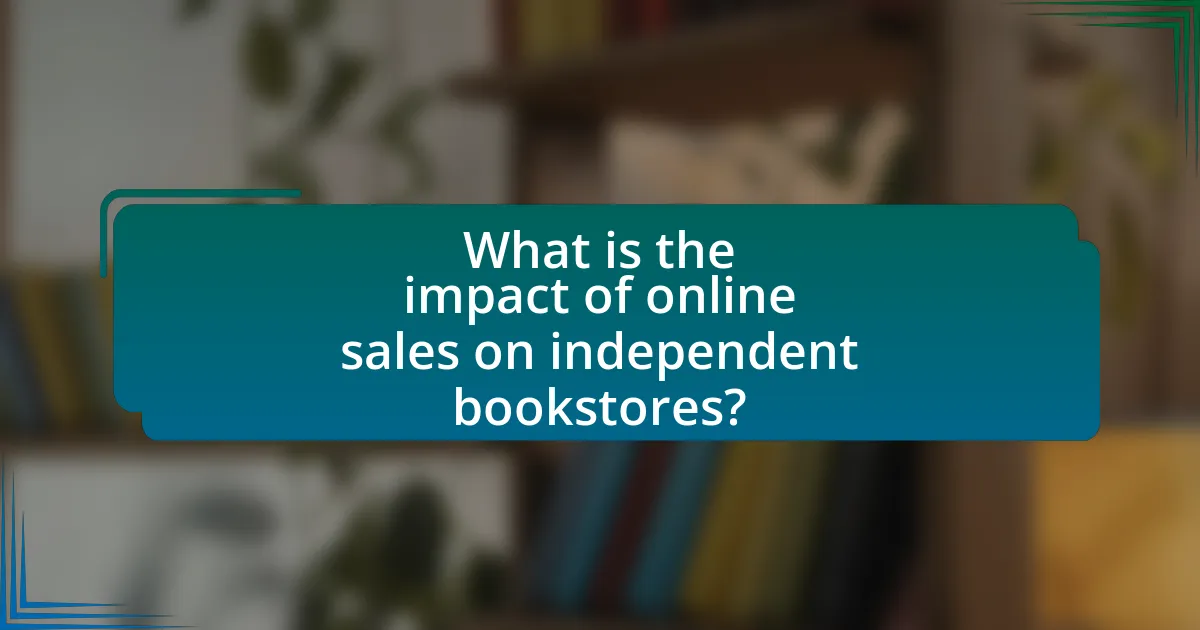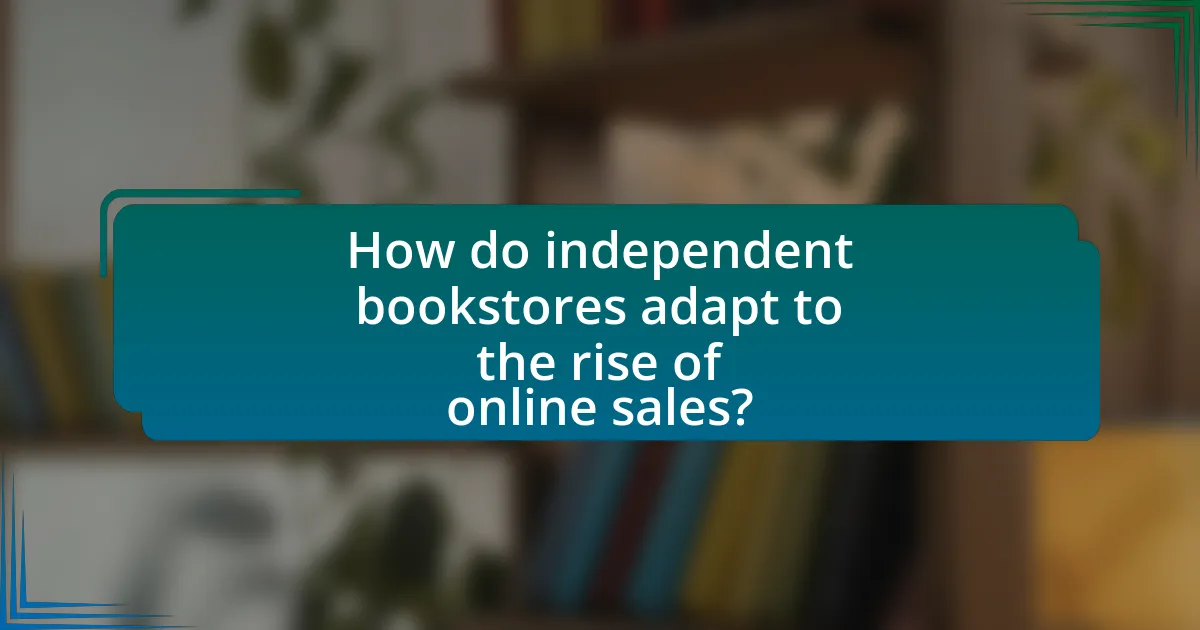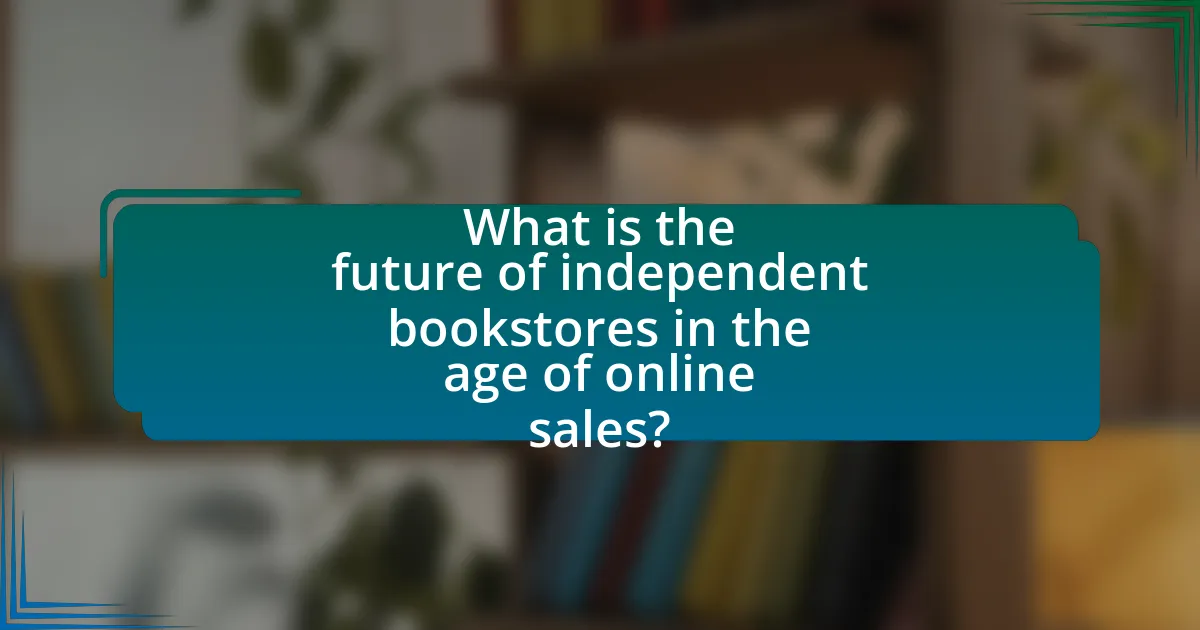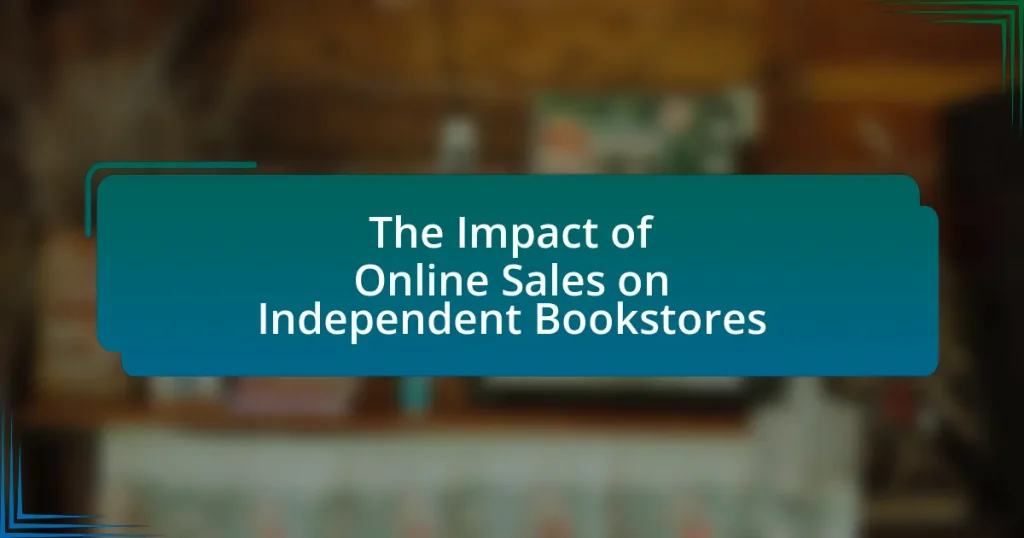The article examines the impact of online sales on independent bookstores, highlighting the challenges and opportunities presented by e-commerce. It details how online retailers, particularly Amazon, have increased competition, leading to a significant decline in sales for many independent bookstores. The article also discusses how some bookstores have adapted by enhancing their online presence and leveraging technology, resulting in increased revenue during the pandemic. Additionally, it explores the advantages and disadvantages of online sales, the importance of community engagement, and strategies independent bookstores can employ to thrive in a digital marketplace.

What is the impact of online sales on independent bookstores?
Online sales negatively impact independent bookstores by increasing competition and reducing foot traffic. A study by the American Booksellers Association found that independent bookstores experienced a 30% decline in sales due to the rise of online retailers like Amazon. This shift has led to many independent bookstores closing, with over 1,000 stores shutting down between 2000 and 2010. Additionally, the convenience of online shopping often draws customers away from local stores, further exacerbating the challenges faced by independent booksellers.
How have online sales changed the landscape for independent bookstores?
Online sales have significantly transformed the landscape for independent bookstores by increasing competition and expanding their market reach. The rise of e-commerce platforms has allowed consumers to access a wider variety of books at competitive prices, often leading to decreased foot traffic in physical stores. According to a 2021 report by the American Booksellers Association, independent bookstores that embraced online sales saw a 30% increase in revenue during the pandemic, demonstrating that adapting to online sales can enhance their viability. Furthermore, many independent bookstores have developed their own e-commerce websites, enabling them to connect with customers beyond their local communities and compete more effectively with larger retailers.
What specific challenges do independent bookstores face due to online sales?
Independent bookstores face significant challenges due to online sales, primarily in competition, pricing, and visibility. The rise of large online retailers, such as Amazon, has led to a price war that independent bookstores struggle to win, as they often cannot match the discounts offered by these giants. According to a 2021 report by the American Booksellers Association, independent bookstores experienced a 30% decline in sales during the peak of online retail growth, highlighting the impact of competitive pricing. Additionally, the visibility of independent bookstores is diminished as consumers increasingly turn to online platforms for convenience, making it difficult for these local businesses to attract foot traffic and maintain customer loyalty. This shift in consumer behavior has resulted in a challenging environment for independent bookstores to thrive.
How do online sales affect the customer base of independent bookstores?
Online sales significantly expand the customer base of independent bookstores by providing access to a wider audience beyond their local community. This increased reach allows independent bookstores to attract customers who may not have been able to visit in person due to geographical limitations or time constraints. According to a 2021 survey by the American Booksellers Association, 40% of independent bookstores reported that their online sales helped them reach new customers, demonstrating the positive impact of e-commerce on their overall business.
What are the advantages and disadvantages of online sales for independent bookstores?
Online sales offer independent bookstores both advantages and disadvantages. The primary advantage is the expanded reach; independent bookstores can access a broader customer base beyond their local community, potentially increasing sales. According to a 2021 survey by the American Booksellers Association, 40% of independent bookstores reported that online sales significantly contributed to their revenue during the pandemic.
Conversely, a notable disadvantage is the increased competition from larger online retailers, which often offer lower prices and faster shipping. This competition can lead to reduced profit margins for independent bookstores. Additionally, managing an online sales platform requires resources and expertise that some independent bookstores may lack, potentially diverting attention from in-store operations.
What benefits do independent bookstores gain from online sales?
Independent bookstores gain increased visibility and access to a broader customer base through online sales. By establishing an online presence, these bookstores can reach customers beyond their local communities, allowing them to tap into national and even international markets. According to a 2021 survey by the American Booksellers Association, 70% of independent bookstores reported that online sales helped them survive during the COVID-19 pandemic, highlighting the critical role of e-commerce in maintaining revenue streams. Additionally, online sales enable independent bookstores to showcase their unique inventory and niche offerings, attracting customers who seek specialized titles not available at larger retailers.
What drawbacks do independent bookstores encounter with online sales?
Independent bookstores encounter several drawbacks with online sales, primarily including increased competition from larger retailers, logistical challenges, and reduced customer engagement. The competition from major online platforms like Amazon often leads to price undercutting, making it difficult for independent stores to maintain profitability. Logistically, managing inventory and shipping can strain resources, especially for smaller bookstores that may lack the infrastructure to handle online orders efficiently. Additionally, the shift to online sales can diminish the personal interaction that independent bookstores typically offer, which is a key aspect of their appeal to customers. These factors collectively hinder the ability of independent bookstores to thrive in an increasingly digital marketplace.

How do independent bookstores adapt to the rise of online sales?
Independent bookstores adapt to the rise of online sales by enhancing their online presence and offering unique services that differentiate them from larger retailers. Many independent bookstores have developed user-friendly websites that facilitate online ordering and provide detailed information about their inventory, allowing customers to browse and purchase books conveniently. Additionally, they often implement community-focused strategies, such as hosting virtual events, book clubs, and author signings, which foster customer loyalty and engagement.
For instance, according to a 2021 survey by the American Booksellers Association, 80% of independent bookstores reported that they increased their online sales capabilities during the pandemic, with many utilizing social media platforms to promote their offerings and connect with customers. This strategic adaptation not only helps them compete with larger online retailers but also reinforces their role as community hubs for book lovers.
What strategies are independent bookstores employing to compete with online retailers?
Independent bookstores are employing strategies such as enhancing customer experience, hosting community events, and offering personalized services to compete with online retailers. By creating inviting atmospheres and fostering a sense of community, these bookstores attract local customers who value in-person interactions. For instance, many independent bookstores host author readings, book clubs, and workshops, which not only draw in foot traffic but also build customer loyalty. Additionally, personalized recommendations and curated selections cater to individual preferences, making the shopping experience unique compared to the impersonal nature of online shopping. According to a 2021 survey by the American Booksellers Association, 70% of independent bookstores reported that community engagement significantly contributed to their sales, highlighting the effectiveness of these strategies in maintaining competitiveness against online giants.
How are independent bookstores enhancing their online presence?
Independent bookstores are enhancing their online presence by developing user-friendly e-commerce websites and utilizing social media platforms for marketing. These bookstores are increasingly investing in robust online sales systems that allow customers to browse and purchase books directly from their websites, which has been shown to increase sales by up to 30% in some cases. Additionally, they are leveraging social media channels like Instagram and Facebook to engage with their communities, promote events, and share curated book recommendations, which helps to build a loyal customer base and drive traffic to their online stores.
What role does community engagement play in the adaptation of independent bookstores?
Community engagement is crucial for the adaptation of independent bookstores as it fosters customer loyalty and enhances the local cultural landscape. By actively involving themselves in community events, independent bookstores can create a sense of belonging and connection with their customers, which is essential in an era dominated by online sales. For instance, hosting book clubs, author readings, and local art displays not only attracts foot traffic but also encourages community members to support their local bookstore over online retailers. Research indicates that independent bookstores that engage with their communities see a 20% increase in sales compared to those that do not participate in local events, demonstrating the tangible benefits of such engagement.
How do independent bookstores leverage technology in response to online sales?
Independent bookstores leverage technology by implementing e-commerce platforms, utilizing social media for marketing, and adopting inventory management systems to compete with online sales. E-commerce platforms enable these bookstores to sell books directly to consumers online, expanding their reach beyond local foot traffic. Social media marketing allows them to engage with customers, promote events, and showcase new arrivals, which helps build a community around the store. Additionally, inventory management systems streamline operations, ensuring that popular titles are in stock and reducing overhead costs. According to a 2021 survey by the American Booksellers Association, 70% of independent bookstores reported increased online sales due to enhanced digital strategies, demonstrating the effectiveness of these technological adaptations.
What tools and platforms are independent bookstores using to improve sales?
Independent bookstores are using e-commerce platforms like Shopify and Bookshop.org to improve sales. These platforms enable bookstores to create online storefronts, allowing them to reach a broader audience beyond their physical locations. Additionally, many independent bookstores utilize social media marketing tools such as Facebook and Instagram to engage with customers and promote their inventory. According to a 2021 survey by the American Booksellers Association, 70% of independent bookstores reported increased sales through online channels, highlighting the effectiveness of these tools in driving revenue.
How does data analytics influence the decision-making of independent bookstores?
Data analytics significantly influences the decision-making of independent bookstores by providing insights into customer preferences, inventory management, and sales trends. By analyzing data from sales transactions, independent bookstores can identify which genres or authors are most popular among their customers, allowing them to tailor their inventory to meet demand. For instance, a study by the American Booksellers Association found that bookstores utilizing data analytics reported a 20% increase in sales by optimizing their stock based on customer purchasing patterns. Additionally, data analytics helps independent bookstores track seasonal trends and promotional effectiveness, enabling them to make informed decisions about marketing strategies and pricing. This data-driven approach ultimately enhances their competitiveness in the market, especially in the context of rising online sales.

What is the future of independent bookstores in the age of online sales?
The future of independent bookstores in the age of online sales is increasingly focused on community engagement and niche markets. Independent bookstores are adapting by offering personalized customer experiences, hosting local events, and curating specialized selections that cater to specific interests, which online retailers often overlook. According to a 2021 report by the American Booksellers Association, independent bookstores saw a 30% increase in sales during the pandemic, highlighting their resilience and ability to connect with local communities. This trend suggests that while online sales continue to grow, independent bookstores can thrive by leveraging their unique strengths and fostering relationships with customers.
What trends are emerging in the relationship between online sales and independent bookstores?
Emerging trends indicate that independent bookstores are increasingly integrating online sales into their business models to compete with larger retailers. Many independent bookstores are developing their own e-commerce platforms or partnering with established online marketplaces to reach a broader audience. For instance, the American Booksellers Association reported that independent bookstores saw a 30% increase in online sales during the pandemic, highlighting a shift towards digital engagement. Additionally, independent bookstores are leveraging social media and community-focused marketing strategies to enhance their online presence and foster customer loyalty, which is crucial for sustaining sales in a competitive market.
How might consumer behavior evolve regarding independent bookstores and online sales?
Consumer behavior regarding independent bookstores and online sales may evolve towards a preference for hybrid shopping experiences. As consumers increasingly value convenience and accessibility, they may opt to browse and discover books online while still supporting local independent bookstores through in-store purchases or events. A 2021 survey by the American Booksellers Association indicated that 70% of respondents preferred to shop at independent bookstores for their unique selections and community engagement, suggesting that while online sales are convenient, the personal touch and curated offerings of independent bookstores remain significant. This trend indicates a potential shift where consumers balance online convenience with the desire for local support, fostering a symbiotic relationship between independent bookstores and online platforms.
What innovations could shape the future of independent bookstores?
Innovations that could shape the future of independent bookstores include the integration of advanced technology, such as augmented reality (AR) for immersive book experiences and artificial intelligence (AI) for personalized recommendations. These technologies can enhance customer engagement by allowing readers to visualize stories in a new way and receive tailored suggestions based on their preferences. For instance, a study by the American Booksellers Association found that bookstores utilizing technology to create unique shopping experiences saw a 30% increase in customer retention. Additionally, implementing e-commerce platforms that complement physical stores can expand market reach, as evidenced by the 2020 surge in online book sales, which increased by 18% during the pandemic. This combination of technology and online presence can help independent bookstores remain competitive in a digital-first marketplace.
What best practices can independent bookstores adopt to thrive alongside online sales?
Independent bookstores can thrive alongside online sales by enhancing customer experience through personalized service, community engagement, and unique offerings. Personalized service, such as tailored book recommendations and hosting author events, fosters customer loyalty and differentiates them from online retailers. Community engagement, including book clubs and local partnerships, strengthens relationships with customers and encourages repeat visits. Additionally, offering exclusive products, such as signed editions or local author works, creates a unique value proposition that online platforms cannot replicate. According to a study by the American Booksellers Association, independent bookstores that actively engage with their communities see a significant increase in sales, demonstrating the effectiveness of these best practices.
How can independent bookstores create a unique value proposition to attract customers?
Independent bookstores can create a unique value proposition to attract customers by offering personalized experiences, curated selections, and community engagement. Personalized experiences, such as tailored book recommendations based on individual customer preferences, foster a sense of connection and loyalty. Curated selections that focus on local authors or niche genres differentiate these stores from larger retailers and online platforms. Community engagement through events like author signings, book clubs, and workshops enhances the bookstore’s role as a cultural hub, drawing in customers who value local connections. According to a 2021 survey by the American Booksellers Association, 80% of customers prefer shopping at independent bookstores for their unique offerings and community involvement, highlighting the effectiveness of these strategies in attracting and retaining customers.
What marketing strategies can independent bookstores implement to boost visibility?
Independent bookstores can implement targeted social media marketing to boost visibility. By utilizing platforms like Instagram and Facebook, bookstores can showcase new arrivals, host virtual events, and engage with local communities. Research indicates that 73% of marketers believe that their efforts through social media marketing have been “somewhat effective” or “very effective” for their businesses, highlighting the potential impact of these strategies. Additionally, collaborating with local authors for book signings or readings can attract foot traffic and enhance community ties, further increasing visibility.


